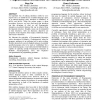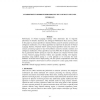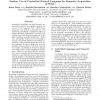1227 search results - page 30 / 246 » Natural Language Processing as a Source of Linguistic Knowle... |
82
Voted
ASSETS
2005
ACM
14 years 11 months ago
2005
ACM
We propose an integrated approach to interactive word-completion for users with linguistic disabilities in which semantic knowledge combines with n-gram probabilities to predict s...
99
Voted
COGSCI
2010
14 years 8 months ago
2010
Natural language is full of patterns that appear to fit with general linguistic rules but are ungrammatical. There has been much debate over how children acquire these ‘‘ling...
CHI
2005
ACM
15 years 10 months ago
2005
ACM
An important way of making interfaces usable by nonexpert users is to enable the use of natural language input, as in natural language query interfaces to databases, or MUDs and M...
IJCSA
2008
14 years 9 months ago
2008
: Performance of Natural Language Interface often deteriorates due to linguistic phenomena of Semantic Symmetry and Ambiguous Modification (Katz and Lin, 2003). In this paper we pr...
ESWS
2009
Springer
15 years 4 months ago
2009
Springer
Knowledge Acquisition through Semantic Annotation is vital to the evolution, growth and success of the Semantic Web. Both Semiautomatic and Manual Annotation are constricted by a ...



